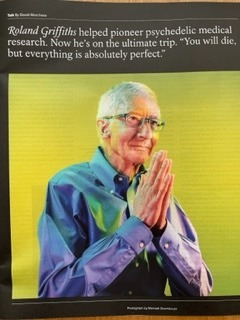Psychedelics Gift to the Terminal
(photo credit, Mamadi Doumbouya, New York Times Magazine)
When a noted pioneer in the field of psychedelics walks the ultimate walk, it is high time to pay attention. That is what the New York Times Magazine did on April 9 in a four-page interview with Dr. Roland Griffiths, founding director of the Johns Hopkins Center for Psychedelic and Consciousness Research.
For over a decade, Griffiths, 76, has investigated ways psychedelics can help treat psychological distress in patients with a life-threatening cancer diagnosis. Now he is such a patient himself, for he has been diagnosed with Stage 4 metastatic colon cancer.
Yet in the interview with NYT Magazine’s Talk Editor David Marchese, it is evident that not despite but because of the diagnosis, Griffiths finds himself experiencing an unexpected and heightened kind of perception. An awareness, especially of how precious life is. He says he did not need extra trips to reach this state, but arguably his work with terminal patients and previous direct experience with psychedelics has given him a mind set of readiness for the final trip.
In the early 1960s - before research in the field was banned until it gradually resumed starting around year 2000) - among the many kinds of exploratory studies were those looking at the application of psychedelics as a psychological aid to terminal patients, studies then indicating positive results.
That was around the same time as Aldous Huxley made a final, personal choice. It was November 22, 1963, by sheer coincidence the same day as JFK’s assassination. The incident at Huxley’s home in the Hollywood Hills also dealt with death, but on Huxley’s terms. An exploration of the final moments of consciousness.
As he lay dying of cancer when the end was near, he scribbled a note to his wife, Laura Archera Huxley, asking for an intramuscular dose of LSD. Apparently it was planned; the LSD was on hand. Unlike his reflection on the experience a decade earlier in his book The Doors of Perception, there was no reportage, no recording, no notes. We do not know his perception of this final act. But historically, it set a mark for someone of note and celebrity involved with psychedelic study to walk the walk, in Huxley’s case, creating an iconic biographical exit.
Now. following in Huxley’s tradition, one of the giants in modern psychedelic research, Dr. Roland Griffiths, has spoken out in the far-reaching forum of the New York Times Magazine, telling his story.

#Roland Griffiths,#terminal patients,#psychedelics,#LSD,#David Marchese,#New York Times Magazine,#Aldous Huxley,#Aldous Huxley’s Hands



